状语从句中使用because,请务必注意!
because用法归纳总结
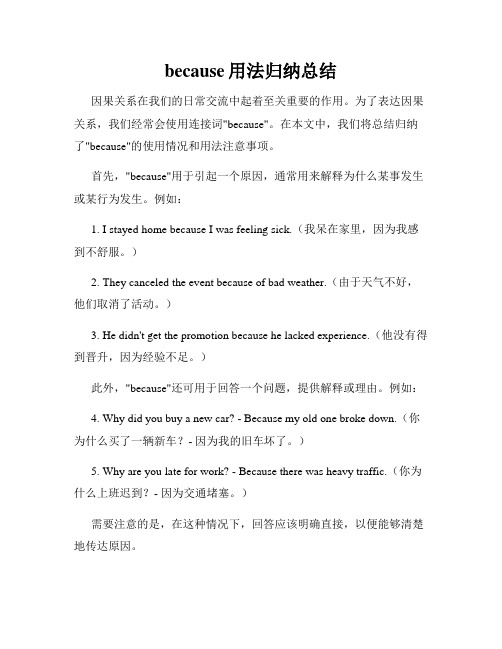
because用法归纳总结因果关系在我们的日常交流中起着至关重要的作用。
为了表达因果关系,我们经常会使用连接词"because"。
在本文中,我们将总结归纳了"because"的使用情况和用法注意事项。
首先,"because"用于引起一个原因,通常用来解释为什么某事发生或某行为发生。
例如:1. I stayed home because I was feeling sick.(我呆在家里,因为我感到不舒服。
)2. They canceled the event because of bad weather.(由于天气不好,他们取消了活动。
)3. He didn't get the promotion because he lacked experience.(他没有得到晋升,因为经验不足。
)此外,"because"还可用于回答一个问题,提供解释或理由。
例如:4. Why did you buy a new car? - Because my old one broke down.(你为什么买了一辆新车?- 因为我的旧车坏了。
)5. Why are you late for work? - Because there was heavy traffic.(你为什么上班迟到?- 因为交通堵塞。
)需要注意的是,在这种情况下,回答应该明确直接,以便能够清楚地传达原因。
此外,"because"还可以与副词或短语一起使用,以提供更详细的原因解释。
例如:6. They couldn't attend the party because they were out of town.(他们不能参加派对,因为他们不在城里。
)7. He failed the exam because he didn't study enough.(他考试没通过,因为他没学够。
because的用法和短语例句
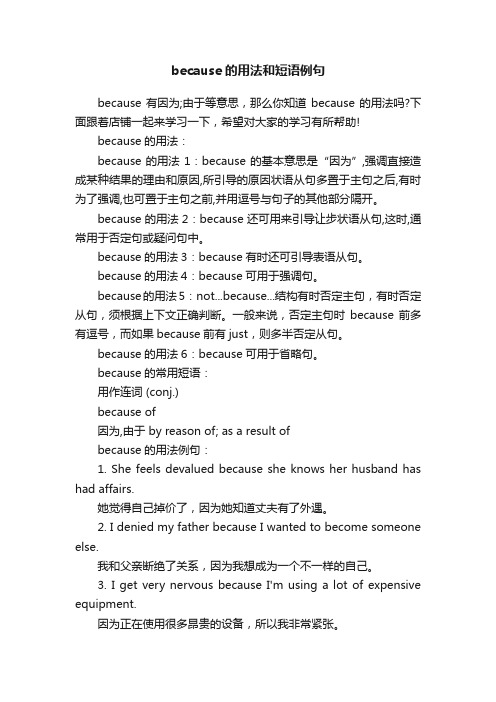
because的用法和短语例句because有因为;由于等意思,那么你知道because的用法吗?下面跟着店铺一起来学习一下,希望对大家的学习有所帮助!because的用法:because的用法1:because的基本意思是“因为”,强调直接造成某种结果的理由和原因,所引导的原因状语从句多置于主句之后,有时为了强调,也可置于主句之前,并用逗号与句子的其他部分隔开。
because的用法2:because还可用来引导让步状语从句,这时,通常用于否定句或疑问句中。
because的用法3:because有时还可引导表语从句。
because的用法4:because可用于强调句。
because的用法5:not...because...结构有时否定主句,有时否定从句,须根据上下文正确判断。
一般来说,否定主句时because前多有逗号,而如果because前有just,则多半否定从句。
because的用法6:because可用于省略句。
because的常用短语:用作连词 (conj.)because of因为,由于 by reason of; as a result ofbecause的用法例句:1. She feels devalued because she knows her husband has had affairs.她觉得自己掉价了,因为她知道丈夫有了外遇。
2. I denied my father because I wanted to become someone else.我和父亲断绝了关系,因为我想成为一个不一样的自己。
3. I get very nervous because I'm using a lot of expensive equipment.因为正在使用很多昂贵的设备,所以我非常紧张。
4. Because you're not burning calories, everything you eat turns to fat.由于没有消耗卡路里,你吃的所有东西都会变成脂肪。
原因状语从句的构造与使用
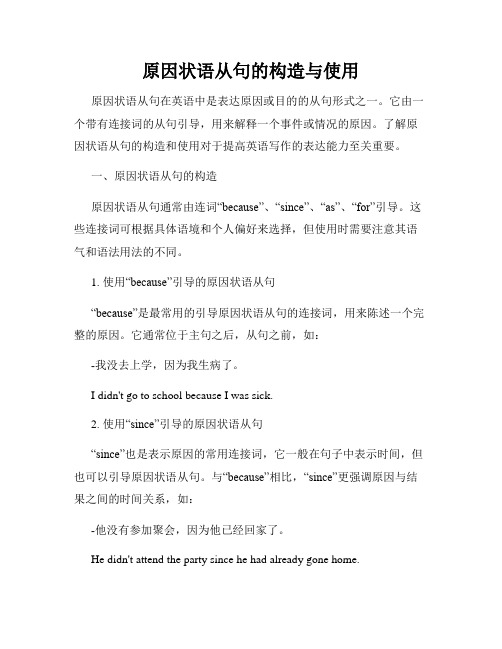
原因状语从句的构造与使用原因状语从句在英语中是表达原因或目的的从句形式之一。
它由一个带有连接词的从句引导,用来解释一个事件或情况的原因。
了解原因状语从句的构造和使用对于提高英语写作的表达能力至关重要。
一、原因状语从句的构造原因状语从句通常由连词“because”、“since”、“as”、“for”引导。
这些连接词可根据具体语境和个人偏好来选择,但使用时需要注意其语气和语法用法的不同。
1. 使用“because”引导的原因状语从句“because”是最常用的引导原因状语从句的连接词,用来陈述一个完整的原因。
它通常位于主句之后,从句之前,如:-我没去上学,因为我生病了。
I didn't go to school because I was sick.2. 使用“since”引导的原因状语从句“since”也是表示原因的常用连接词,它一般在句子中表示时间,但也可以引导原因状语从句。
与“because”相比,“since”更强调原因与结果之间的时间关系,如:-他没有参加聚会,因为他已经回家了。
He didn't attend the party since he had already gone home.3. 使用“as”引导的原因状语从句“as”在原因状语从句中的使用通常表示两个事件同时发生。
它比较正式,用于书面语言或较正式的口语场合,如:-她辞去了工作,因为她即将出国留学。
She quit her job as she was going abroad for further studies.4. 使用“for”引导的原因状语从句“for”在表示原因时相对较少使用,它比较常用于句型“for + 宾语 +不定式”中,如:-我辞去工作,是为了追求自己的梦想。
I quit my job for the sake of pursuing my dream.二、原因状语从句的使用原因状语从句可以在句子中作为陈述或补充解释一个事件的原因,有助于提供更多的细节或解释。
英语语法原因状语从句用法说明

英语语法原因状语从句用法说明英语语法原因状语从句用法说明原因状语从句主要的有because, as, since, seeing (that), now (that), considering (that) 等。
如:1. 由because引导He couldn’t get to school because he hada cold. 他因患感冒而未能去上学。
I can’t take the examination because I am ill. 我不能参加考试因为我生病了。
He distrusted me because I was new. 他不信任我是因为我是新来的`。
Because I worked fast, I finished early. 因为我干得快,所以我完成得早。
They can’t have gone out because the light’s on. 他们不可能出去了,因为灯还亮着。
He could not concentrate because the room was noisy. 他不能集中思想,因为房里太吵。
I read no further than the caption because the subject of the article seemed uninteresting. 我只看了标题,因为文章题目似乎不引人兴趣。
I could have gone with you because I was there at that time. 我本来可以和你一道去的,因为那时我也在那里。
2. 由as引导As all the seats full I stood up. 因为所有座位都有人,我就站了起来。
As it’s raining, we’ll have to stay at home. 因为天下雨,我们得待在家里。
As all the seats were full he stood up. 由于所有座位都有人了,他站了起来。
because,for,since, as 原因状语从句

原因状语从句1.because,for,since,asbecause,for,since,as在原因状语从句中意思几乎一样,翻译成中文也往往都翻译成”因为“,然而这四个词在使用上其实也是有着一些微妙的差别的。
一. because引导的原因状语从句一般放于主句的后面,because从句位于句首时要用逗号分开,放在句末时,可不用逗号分开。
because表示直接原因,语气最强,最适合回答why引导的疑问句。
Because of也表示原因,但它后面不接从句,只能接名词,代词或动名词。
注意:because 和so 不可同时出现在一个句子里。
I do it because I like it. = I like it so I do it.We went by bus because it was cheaper. = It was cheaper so we went by bus.He can’t go to school because of his illness.二. since表示一种附带的原因,引导的原因状语从句一般放于主句之前表示已知的、显然的理由(通常被翻译成“既然”= now that ),较为正式,语气比because弱。
Since you are free today, you had better help me with my mathematics. Since you don't trust him, you should not employ him.Now (that) you are grown up, you should not rely on your parents.三. as所表示的理由最弱,只是对主句的附带说明,重点在主句。
表示“双方已知的原因”,含有对比说明的意味,较为正式,位置较为灵活(常放于主句之前)。
As it is raining, you’d better take a taxi.As I am about to start on a journey, I shall not be able to begin the work before I return.四. for引导的从句但并不说明主句行为发生的直接原因,只提供一些说明情况的补充说明。
because知识点用法

because知识点用法在英语中,单词"because"是一个连词,用于表示原因或解释。
它将一个原因与一个结果进行连接,使得语句更加连贯和合理。
以下是一些关于"because"连词的常见用法和例句:1. 使用"because"引导原因状语从句:"I couldn't attend the party because I had to work late."(我不能参加派对,因为我得工作到很晚。
)2. 使用"because of"表达原因或解释:"He couldn't come to the meeting because of a family emergency."(他因为家庭紧急情况无法参加会议。
)3. "because"后面通常跟着完整的句子,而不是短语或单词:错误示范:I didn't go out because raining.正确示范:I didn't go out because it was raining.(我没出门,因为下雨了。
)4. "because"可以位于句首或句中,但通常在句子中间使用逗号分隔:"Because it was raining, we decided to stay indoors."(因为下雨了,我们决定呆在室内。
)"We decided to stay indoors because, it was raining."(我们决定呆在室内,因为下雨了。
)请注意,使用"because"时应注意以下几点:- 不要滥用"because",过多的使用会使句子变得累赘。
- 避免使用复杂的句子结构,以免造成理解困难。
原因状语从句:使用because的五点注意
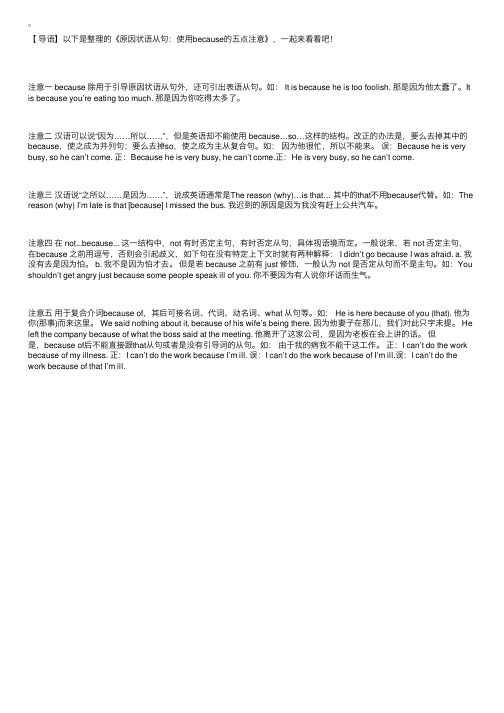
【导语】以下是整理的《原因状语从句:使⽤because的五点注意》,⼀起来看看吧!注意⼀ because 除⽤于引导原因状语从句外,还可引出表语从句。
如: It is because he is too foolish. 那是因为他太蠢了。
It is because you’re eating too much. 那是因为你吃得太多了。
注意⼆汉语可以说“因为……所以……”,但是英语却不能使⽤ because…so…这样的结构。
改正的办法是,要么去掉其中的because,使之成为并列句;要么去掉so,使之成为主从复合句。
如:因为他很忙,所以不能来。
误:Because he is very busy, so he can’t come. 正:Because he is very busy, he can’t come.正:He is very busy, so he can’t come.注意三汉语说“之所以……是因为……”,说成英语通常是The reason (why)…is that… 其中的that不⽤because代替。
如:The reason (why) I’m late is that [because] I missed the bus. 我迟到的原因是因为我没有赶上公共汽车。
注意四在 not...because... 这⼀结构中,not 有时否定主句,有时否定从句,具体视语境⽽定。
⼀般说来,若 not 否定主句,在because 之前⽤逗号,否则会引起歧义,如下句在没有特定上下⽂时就有两种解释: I didn’t go because I was afraid. a. 我没有去是因为怕。
b. 我不是因为怕才去。
但是若 because 之前有 just 修饰,⼀般认为 not 是否定从句⽽不是主句。
如:You shouldn’t get angry just because some people speak ill of you. 你不要因为有⼈说你坏话⽽⽣⽓。
because原因状语从句用法

because原因状语从句用法
"because"引导的原因状语从句可以用来说明一个事件发生的原因。
通常,原因状语从句放在主句之前,可以用不同的句型来表达。
1.因为句子:原因状语从句作为句子的开头,与主句用逗号隔开。
例如:Because it was raining, we stayed indoors.
2.主从句倒装:原因状语从句放在主句之后,主句的主语和谓语动词要倒装。
例如:We stayed indoors because it was raining.
3.用作插入语:原因状语从句可以插入主句中,用逗号或者破折号隔开。
例如:We stayed indoors, because it was raining.
We stayed indoors – because it was raining.
需要注意的是,原因状语从句中的动词形式要使用主句的时态,因为原因发生在主句之前。
原因状语从句的用法

原因状语从句的用法以下是一些常见的用法:1. "because"引导的原因状语从句:- I didn't go to the party because I was tired.(我没去参加聚会,因为我累了。
)- She didn't finish her homework because she forgot herbooks at school.(她没完成作业,因为她把书忘在学校了。
)2. "since"引导的原因状语从句(可以用来表示原因或时间):- Since it's raining, we can't go to the park.(因为下雨了,我们不能去公园。
)3. "as"引导的原因状语从句(可以用来表示原因或方式):- As it was getting late, we decided to leave.(由于时间已晚,我们决定离开。
)- As she spoke softly, I had to lean in to hear her.(她说话声音很低,我得凑过去听她说什么。
4. "as a result of"引导的原因状语从句(通常用于正式场合):- As a result of heavy traffic, I arrived late for the meeting.(由于交通拥堵的结果,我迟到了会议。
)需要注意的是,原因状语从句通常放在主句之前,但也可以放在主句之后,这时从句前面要加逗号:- I didn't attend the meeting, because I had a doctor's appointment.(我没有参加会议,因为我有个医生预约。
)- We had to cancel the picnic since it was raining heavily.(由于下大雨,我们不得不取消野餐计划。
because等词用法

because,for,since,as等这些词用法怎么区分原因状语从句一般由because, since, as, for引导?注意as,because,since和for的区别:①如果原因是构成句子的最主要部分,一般用because。
because引导的从句一般不放在句子的开头。
例如:I missed the train because I got up late.注:对于以why开头的问句,一般只能用because引导的从句来回答。
②如果原因已为人们所知,或不如句子的其余部分重要,就用as或since、since比as 稍微正式一些。
as和since引导的从句一般放在句子的开头。
例如:As he was not well,I decided to go there without him.Since this method doesn't work, let's try another.③for表示所说的理由是一种补充说明,因此,for引导的从句可以放在括号里,而且for 引导的从句一般不放在句子的开头。
例如:I decided to stop and have lunch, for I was feeling quite hungry.because, for, since和as这四个词作为连词,都有“因为”的意思,都可以用来作为一个动作或情况提供原因或理由,但它们在用法上有区别:because是从属连词,接表示直接原因的从句,往往放在句末(有时也放在句首),直接明白地说明因果关系。
因此,在回答why的提问时或原句有just, only, not…but all等副词强调原因时必须用because.for是并列连语。
接表示间接原因的并列分句,所说的理由是一种补充。
说明for引导的句子一般放在句尾。
试比较:He isn't here today because he is ill.因为他病了,所以他今天没有来。
because,so,so that语法点

因果关系是英语语法中一个非常重要的部分,表示相互关联的事件或行为之间的逻辑连接。
在英语写作中,为了表达清晰的因果关系,因此需要掌握好because, so, so that等语法点。
下面我将从这三个语法点出发,结合实例进行详细解释。
一、because的用法1. because作为连词,用来引导表示原因的从句。
因为表示原因,所以常常放在主句之后。
例如:Our flight was delayed because of the bad weather.由于恶劣天气,我们的航班延误了。
2. because引导的从句可以放在句首也可以放在句尾,但是需要注意的是,当因果关系非常明显的时候,通常将原因放在句首,这样可以使句子更加生动。
例如:Because of the heavy rain, the match was postponed.由于暴雨,比赛被推迟了。
3. because也可以用于回答why的疑问句,表示原因。
例如:Why did you leave early?Because I had to catch a train.你为什么提前离开?因为我要赶火车。
4. 注意,because引导的从句不可单独作为句子使用,必须和主句搭配使用。
二、so的用法1. so作为连词,用来表示因果关系,引导结果状语从句。
所表示的结果通常是由于上文提到的原因而产生的。
例如:The road was icy, so I drove very slowly.路上结冰了,因此我开车很慢。
2. so可以用在主句之前或之后,但是如果是用在主句之后,通常需要在so后面加上逗号,以表示and的含义。
例如:The weather was terrible, so we decided to stay at home.天气太糟糕了,因此我们决定呆在家里。
3. so还可以用来回答前文提到的原因。
例如:Why did you leave early?The meeting finished early, so I left.为什么你提前离开?会议提前结束了,所以我离开了。
because引导原因状语从句
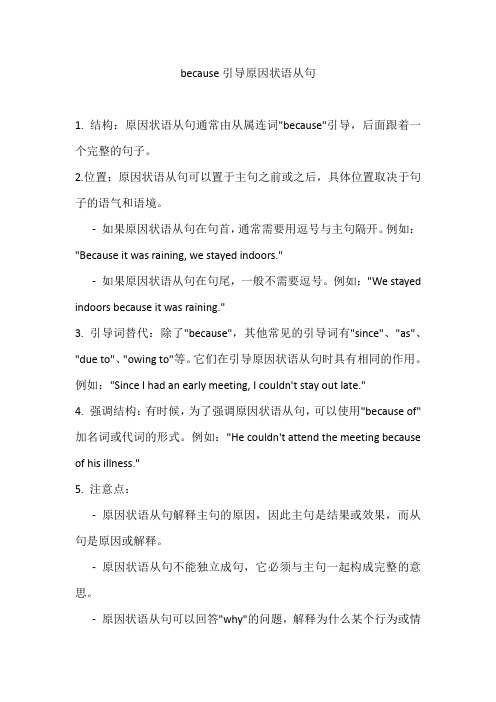
because引导原因状语从句1. 结构:原因状语从句通常由从属连词"because"引导,后面跟着一个完整的句子。
2.位置:原因状语从句可以置于主句之前或之后,具体位置取决于句子的语气和语境。
-如果原因状语从句在句首,通常需要用逗号与主句隔开。
例如:"Because it was raining, we stayed indoors."-如果原因状语从句在句尾,一般不需要逗号。
例如:"We stayed indoors because it was raining."3. 引导词替代:除了"because",其他常见的引导词有"since"、"as"、"due to"、"owing to"等。
它们在引导原因状语从句时具有相同的作用。
例如:"Since I had an early meeting, I couldn't stay out late."4. 强调结构:有时候,为了强调原因状语从句,可以使用"because of"加名词或代词的形式。
例如:"He couldn't attend the meeting because of his illness."5. 注意点:-原因状语从句解释主句的原因,因此主句是结果或效果,而从句是原因或解释。
-原因状语从句不能独立成句,它必须与主句一起构成完整的意思。
-原因状语从句可以回答"why"的问题,解释为什么某个行为或情况发生。
下面是一些例句,展示了"because"引导原因状语从句的用法:1、She didn't go to the party because she had to study for her exam.她没去参加聚会,因为她得准备考试。
原因状语从句4个引导词的使用区分

原因状语从句4个引导词的使用区分
1. because(因为):because引导的原因状语从句表明主句中的一些动作或状态发生的原因。
它一般位于从句之前,主句之后。
例如:- I couldn't attend the party because I was busy with work.(因为工作忙,所以我不能参加晚会。
)
2. since(自从):since引导的原因状语从句表示一个动作或状态自从过去一些时间点以来一直持续或存在。
它既可以置于从句之前,主句之后,也可以放在主句之前。
例如:
- I haven't seen him since he moved away.(自从他搬走后,我就再也没见过他。
)
- Since you're here, let's go for a walk.(既然你在这里,我们一起去散步吧。
)
3. as(由于):as引导的原因状语从句与because用法相似,表示一些动作或状态发生的原因。
它可以放在从句之前,主句之后,也可以放在主句之前。
- She couldn't sleep as she was too excited.(由于太兴奋,她无法入睡。
)
- As the weather was bad, we decided to stay at home.(由于天气不好,我们决定待在家里。
)
4. for(因为):for引导的原因状语从句与because用法相似,表示一些动作或状态发生的原因。
它一般放在从句之前,主句之后。
例如:。
because的用法总结
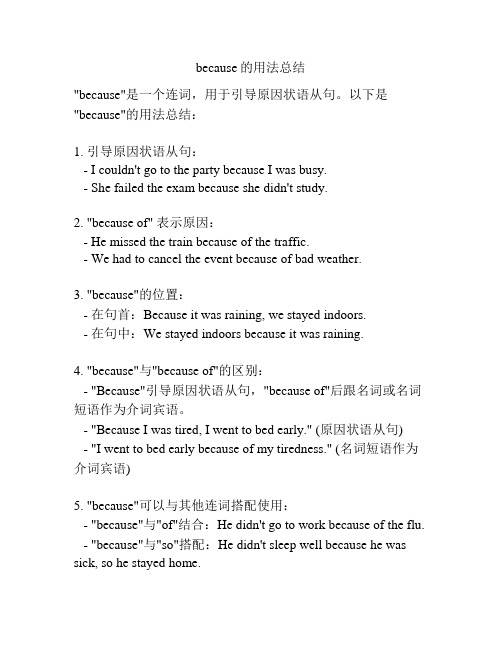
because的用法总结"because"是一个连词,用于引导原因状语从句。
以下是"because"的用法总结:1. 引导原因状语从句:- I couldn't go to the party because I was busy.- She failed the exam because she didn't study.2. "because of" 表示原因:- He missed the train because of the traffic.- We had to cancel the event because of bad weather.3. "because"的位置:- 在句首:Because it was raining, we stayed indoors.- 在句中:We stayed indoors because it was raining.4. "because"与"because of"的区别:- "Because"引导原因状语从句,"because of"后跟名词或名词短语作为介词宾语。
- "Because I was tired, I went to bed early." (原因状语从句)- "I went to bed early because of my tiredness." (名词短语作为介词宾语)5. "because"可以与其他连词搭配使用:- "because"与"of"结合:He didn't go to work because of the flu. - "because"与"so"搭配:He didn't sleep well because he was sick, so he stayed home.总之,"because"用于引导原因状语从句,表达一个事件或情况发生的原因。
because原因状语从句讲解

because原因状语从句讲解1. because是从属连词,引导原因状语从句,表示直接的原因或理由,常用于why引导的疑问句。
如:Why do you like dogs?你为什么喜欢狗?Because they are friendly.因为他们很友好。
2. because引导的原因状语从句可以放在主句前或主句后,但一般放在主句后。
如:I won’t go there because I want to do my homework.我不会去那里,因为我想做家庭作业。
I like winter because I like to skate.我喜欢冬季,因为我喜欢滑冰。
注意:(1)because 习惯上不与so 连用。
在汉语中我们习惯上说“因为…所以…”但在英语中却不能将二者连用。
如:Because it was raining, we stayed at home.因为下雨,所以我们待在家里。
或It was raining , so we stayed at home.错误说法:Because it was raining ,so we stayed at home.(2)because引导的原因状语从句有时可以与because of互换,但because of后面接名词或短语。
如:He can’t come because he is ill.=He can’t come because of his illness.因为生病,所以他没来。
Because of the law in Ireland, we had to work out a way of getting her over to Britain.由于爱尔兰的法律所限,我们不得不想办法把她弄到英国去。
It is mainly because of my fault.这主要是由于我的过错。
because的用法和短语例句
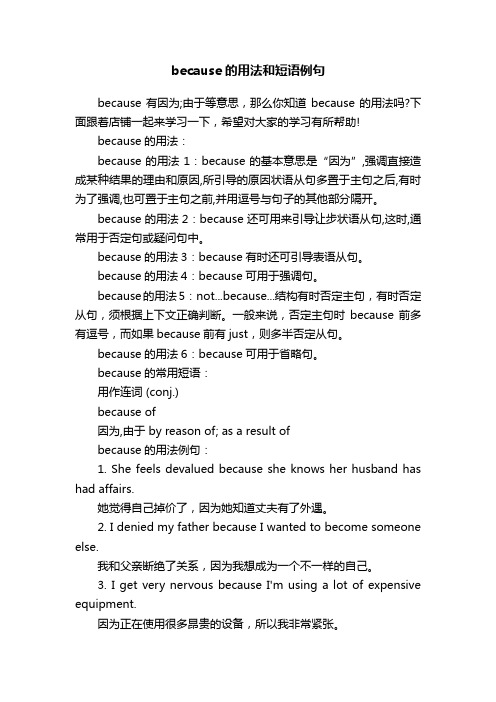
because的用法和短语例句because有因为;由于等意思,那么你知道because的用法吗?下面跟着店铺一起来学习一下,希望对大家的学习有所帮助!because的用法:because的用法1:because的基本意思是“因为”,强调直接造成某种结果的理由和原因,所引导的原因状语从句多置于主句之后,有时为了强调,也可置于主句之前,并用逗号与句子的其他部分隔开。
because的用法2:because还可用来引导让步状语从句,这时,通常用于否定句或疑问句中。
because的用法3:because有时还可引导表语从句。
because的用法4:because可用于强调句。
because的用法5:not...because...结构有时否定主句,有时否定从句,须根据上下文正确判断。
一般来说,否定主句时because前多有逗号,而如果because前有just,则多半否定从句。
because的用法6:because可用于省略句。
because的常用短语:用作连词 (conj.)because of因为,由于 by reason of; as a result ofbecause的用法例句:1. She feels devalued because she knows her husband has had affairs.她觉得自己掉价了,因为她知道丈夫有了外遇。
2. I denied my father because I wanted to become someone else.我和父亲断绝了关系,因为我想成为一个不一样的自己。
3. I get very nervous because I'm using a lot of expensive equipment.因为正在使用很多昂贵的设备,所以我非常紧张。
4. Because you're not burning calories, everything you eat turns to fat.由于没有消耗卡路里,你吃的所有东西都会变成脂肪。
because前加逗号规则

because前加逗号规则因为前加逗号规则在英语语法中,我们经常会遇到在句子中使用连词"because"来表示原因。
然而,有时候我们需要在"because"之前加上逗号来使句子更加清晰和易读。
本文将介绍在使用"because"时前加逗号的规则。
1. 当"because"引导的从句位于主句之前时,我们需要在"because"之前加上逗号。
例如:"Because it was raining, we decided to stay indoors."(因为下雨了,我们决定待在室内。
)在这个例子中,"because it was raining"是一个原因从句,位于主句"we decided to stay indoors"之前,因此我们在"because"之前加上了逗号。
2. 当"because"引导的从句位于主句之后时,我们通常不需要在"because"之前加上逗号。
例如:"We decided to stay indoors because it was raining."(因为下雨了,我们决定待在室内。
)在这个例子中,"because it was raining"仍然是一个原因从句,但它位于主句"we decided to stay indoors"之后,所以我们不需要在"because"之前加上逗号。
3. 有时候,我们可以根据句子的结构和语义需要,在"because"之前加上逗号,即使从句位于主句之后。
这样做可以强调原因从句。
例如: "We decided to stay indoors, because it was raining heavily."(我们决定待在室内,因为下雨很大。
because前加逗号规则

because前加逗号规则以"因为"前加逗号规则为标题,写一篇文章。
因为前加逗号的规则是指在句子中,当"因为"引导的原因状语从句放在句首时,需在原因状语从句的末尾加上逗号。
这样可以使句子结构更清晰,读者更易于理解。
在英语中,因为是表示原因的关联词,用来引导原因状语从句。
当原因状语从句放在句首时,需要在原因状语从句的末尾加上逗号。
这样可以使句子更加通顺,便于理解。
下面将通过一些例句来说明这个规则的应用。
1. 因为天气太热,所以我决定去游泳。
在这个句子中,因为引导的原因状语从句放在句首,所以在从句的末尾加上逗号。
2. 因为他学习努力,所以考试取得了好成绩。
同样地,在这个句子中,因为引导的原因状语从句放在句首,所以要在从句的末尾加上逗号。
3. 因为下雨,所以我们取消了郊游计划。
这个例句中的"因为"同样也是引导原因状语从句的关联词,需要在从句的末尾加上逗号。
通过以上例句可以看出,"因为"前加逗号的规则是比较简单易懂的。
只需记住当"因为"引导的原因状语从句放在句首时,需在原因状语从句的末尾加上逗号即可。
除了以上的例句外,还有一些特殊情况需要注意。
当因为引导的原因状语从句位于句中时,不需要在原因状语从句的末尾加上逗号。
比如:4. 我们取消了郊游计划,因为下雨了。
在这个句子中,原因状语从句位于句子的中间,所以不需要在从句的末尾加上逗号。
5. 我决定去游泳,因为天气太热了。
同样地,这个句子中的原因状语从句也位于句子的中间,不需要在从句的末尾加上逗号。
总结起来,"因为"前加逗号的规则是指在句子中,当"因为"引导的原因状语从句放在句首时,需在原因状语从句的末尾加上逗号。
而当原因状语从句位于句中时,则不需要在从句的末尾加上逗号。
这个规则的正确运用可以使句子结构更加清晰,读者更容易理解句子的意思。
原因状语从句because与for用法精析

原因状语从句because与for用法精析想要掌握原因状语从句,就要准确理解它的从属连词的意义和用法,以及不同从属连词之间的用法区别,小编为大家准备了一系列的解析,一起来看看吧!由because引导的原因状语从句可单独用来回答why-问句,而for-分句不可以。
例如:—Why does the doctor look so tried and sleepy?—Because he sat up all night with patient.作为原因状语,because-分句可在because之前带否定词或其他修饰语,还可以带某些并列连词,而for-分句不可以。
例如:The doctor looks tried and sleepy simply because he sat up all night with the patient.The doctor looks tried and sleepy not because he isn’t feeling well, but because he sat up all night with the patient.第四,作为原因状语,because-分句可作为分裂句中心成分,而for-分句不可以。
例如:It is because he sat up all night with the patient that the doctor looks tried and sleepy.以上所言because-分句与for-分句用法上的区别仅就代表“直接理由”即为某一事实说明原因这一用法而言。
如果because-分句表示“直接理由”,即对说话人为何说这种话提出理由,那么这种because-分句,和for-分句一样,只能位于主句之后,既不能用以回答why-分句,也不能在because之前用否定词或其他修饰语,当然也不能作分裂句中心成分。
连词for还可以引导一个句子,为上文陈述的情况说明或提供理由,而because-分句通常引导从属分句,除了用于回答why-问句以外,because-分句通常不单独出现。
- 1、下载文档前请自行甄别文档内容的完整性,平台不提供额外的编辑、内容补充、找答案等附加服务。
- 2、"仅部分预览"的文档,不可在线预览部分如存在完整性等问题,可反馈申请退款(可完整预览的文档不适用该条件!)。
- 3、如文档侵犯您的权益,请联系客服反馈,我们会尽快为您处理(人工客服工作时间:9:00-18:30)。
外教一对一
状语从句中使用because,请务必注意!
注意1
because 除用于引导原因状语从句外,还可引出表语从句。
如:
It is because he is too foolish. 那是因为他太蠢了。
It is because you’re eating too much. 那是因为你吃得太多了。
注意2
汉语可以说“因为……所以……”,但是英语却不能使用because…so…这样的结构。
改正的办法是,要么去掉其中的because,使之成为并列句;要么去掉so,使之成为主从复合句。
如:
因为他很忙,所以不能来。
误:Because he is very busy, so he can’t come.
正:Because he is very busy, he can’t come.
正:He is very busy, so he can’t come.
注意3
汉语说“之所以……是因为……”,说成英语通常是The reason (why)…is that… 其中的that最好不用because代替。
如:The reason (why) I’m late is that [because] I missed the bus. 我迟到的原因是因为我没有赶上公共汽车。
外教一对一
注意4
在 not...because... 这一结构中,not 有时否定主句,有时否定从句,具体视语境而定。
一般说来,若 not 否定主句,最好在because 之前用逗号,否则会引起歧义,如下句在没有特定上下文时就有两种解释:
I didn’t go because I was afraid.
a. 我没有去是因为怕。
b. 我不是因为怕才去。
但是若 because 之前有 just 修饰,一般认为 not 是否定从句而不是主句。
如:
You shouldn’t get angry just because some people speak ill of you. 你不要因为有人说你坏话而生气。
注意5
用于复合介词because of,其后可接名词、代词、动名词、what 从句等。
如:
He is here because of you (that). 他为你(那事)而来这里。
We said nothing about it, because of his wife’s being there. 因为他妻子在那儿,我们对此只字未提。
He left the company because of what the boss said at the meeting. 他离开了这家公司,是因为老板在会上讲的话。
但是,because of后不能直接跟that从句或者是没有引导词的从句。
如:
由于我的病我不能干这工作。
外教一对一 正:I can’t do the work because of my illness.
正:I can’t do the work because I’m ill.
误:I can’t do the work because of I’m ill.
误:I can’t do the work because of that I’m ill.。
